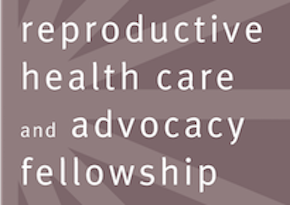Our Fellowship evaluation results are in

RHAP recently completed an Evaluation of our Reproductive Health Care and Advocacy Fellowship. This one-year post-residency fellowship aims to develop leaders who will promote and teach full-spectrum women’s reproductive health care within family medicine. The Fellowship started in 2007 with one Fellow per year. In 2013 the program expanded to include three Fellows per year, and in 2015 the Fellowship expanded even further, and included an additional Fellow at a site in Massachusetts. The 2016-2017 cohort will include a total of six Fellows. In addition to clinical skills, the fellowship teaches Fellows how to teach procedures, how to give seminars and educational workshops, and how act as an advocate – areas that are not routinely covered during residency.
The purpose of this study was to evaluate the Reproductive Health Care and Advocacy Fellowship. We conducted structured phone interviews with 8 former fellows, and 9 former fellows participated in an online survey. We analyzed both the quantitative and qualitative data. Most Fellows (77.8%) were teaching residents in one of their current settings. All of the fellows reported providing IUDs, implants, and expectant management for miscarriage. Most (77.8%) fellows reported providing medication management for miscarriage, and more than half (55.6%) were providing uterine aspiration management for miscarriage. More than half of the fellows were providing medication abortion and uterine aspiration abortion (66.7% each).
Fellows described their reasons for applying to the Fellowship. Almost all participants stated that they wanted to gain additional expertise and more in-depth knowledge within the field of reproductive health, and to become an advocate:
“Also, to be exposed to all facets of reproductive health: research, advocacy, just basic in-depth knowledge. In residency, you get an overview of everything but you don’t get in-depth knowledge. I was seeking more in-depth dedicated knowledge in this whole field.”
During the fellowship, the Fellows felt they received high-volume procedure training, which then helped them feel competent in providing reproductive health care:
“The clinical experience is like one in a million. There are not any other fellowships that provide the numbers that we get in a family medicine fellowship.”
Several fellows noted that much of their Fellowship experience was focused on teaching, and how this was the “next level” of expertise after learning how to perform procedures:
“But really, RHAP took me to the next level, where I felt very comfortable teaching other people how to do that.”
They noted that becoming competent in providing reproductive health care did not necessarily mean that someone is then competent at teaching. They saw them as related but separate skill sets. Fellows also discussed how important it was that they had the Fellowship Directors there to guide them on how to teach others. These Fellowship Directors “trained the trainers” and gave the Fellows feedback on how to teach more effectively.
Most Fellows discussed their teaching experiences in their jobs after Fellowship. Fellows described teaching as one of their main employment activities, and they taught a range of different learners, including medical students and residents. Several Fellows also described how they expanded or improved the care provided at their post-Fellowship positions:
“I did IUDs. I did family planning. I had to start from scratch. I had to order instruments. I had to order supplies. And bring all of those services into the primary care setting.”
Several Fellows discussed advocacy activities that they participated in. These activities included writing letters to the editor about reproductive health topics, speaking at events, participating in Lobby Days, presenting at conferences, and participating in committees. The Fellows also gave valuable feedback on how we can improve the experience for future Fellows.
Evaluating work is important so that we can improve our programs and expand our impact. We will be releasing a more detailed report on our findings in the next few months.
